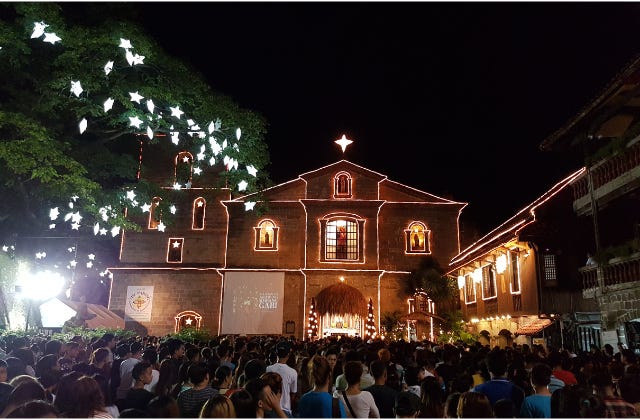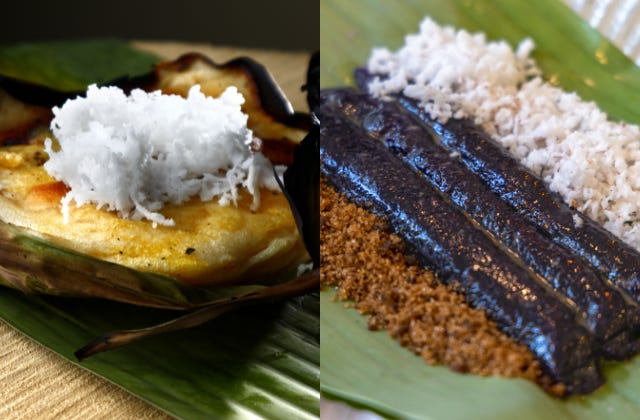From Misa to Bibingka: The Joyful Journey of Simbang Gabi in the Philippines
Why Filipinos wake up before sunrise for nine days every December.
The Bamboo Organ Church of Las Piñas City during Simbang Gabi, photo by Ervin Malicdem
The Philippines has a number of Christmas traditions but if you’re looking for THE tradition that truly captures the heart of a Filipino Christmas, it is Simbang Gabi.
During the month of December, Filipinos across the country, and even abroad, wake up in the early hours of the morning to attend these special dawn masses. It’s a tradition that’s a blend of faith, community, and of course, food.
As someone who grew up experiencing Simbang Gabi, I can say that it’s not just about attending the masses - it’s an experience that wraps you in the warmth of the Filipino Christmas spirit.
The Origin of Simbang Gabi
Simbang Gabi literally means “Night Mass”, but here’s the twist - it’s actually held at dawn. This tradition started in 1669 during the Spanish occupation. Back then, at the early days of December, these novena masses were customarily done in the evening but the priests observed that people would still attend despite their exhaustion. As a sort of compromise, the Spanish friars began to say masses in the early morning to allow the farmers to hear mass before going to the fields for their days work.
The Simbang Gabi series starts on December 16th and runs for nine consecutive days, leading up to Christmas Eve. It’s a devotional practice that many Filipinos still do today. There’s this common belief that if you complete all nine days of masses, a special wish will be granted.
Getting up at 4:00 AM normally isn’t easy, but there’s something magical about stepping into the cool December air and heading to church while the rest of the world is still asleep. The streets are hushed and yet alive with the soft glow of parols (Christmas lanterns) and the intermittent lively chatter of people walking to mass.
A Feast for the Soul... and the Stomach
Simbang Gabi is an act of faith and a spiritual journey. And part of its charm is what happens after the mass.
Outside every church, you’ll find food stalls serving up Filipino Christmas treats like bibingka (a sweet rice cake baked in clay pots) and puto bumbong (purple rice cakes steamed in bamboo tubes).
As a kid, I used to look forward to the taste of those warm bibingkas topped with butter, sugar, and grated coconut, paired with a hot cup of tsokolate (native hot chocolate) or for some, hot cup of salabat (ginger tea).
The memory of eating those goodies fresh off the grill while sitting on a plastic stool and chatting with family or neighbors takes me back to those moments where I felt that Christmas has truly arrived.
The delectable bibingka and puto bumbong
Community and Connection
Simbang Gabi is also a reflection of Filipino values.
One of the notable and meaningful aspects of Simbang Gabi is how it fosters the sense of community – how it brings people together. There’s a sense of camaraderie in sharing the experience with the community. It doesn’t matter if you’re groggy or still half-asleep, everyone is united in their faith and the joy of the season.
It’s a communal celebration and not just about individual devotion.
Simbang Gabi brings people out: churches are packed with families, barkadas (groups of friends), couples and singles alike. Even the elderly and kids, bundled up in jackets, brave the chilly morning and make the effort to attend.
It shows our deep faith, our love for family and community, and our knack for finding joy in simple things like shared meals and early-morning conversations.
And for Filipinos abroad, Simbang Gabi is a way to feel connected to home, with many communities organizing and holding their own dawn masses.
The Journey to Christmas
For many, Simbang Gabi feels like the perfect lead-up to Christmas Day. It’s nine days of reflection, laughter, and delicious food. By the time Christmas Eve rolls around, it feels like the entire community has come together in heightened anticipation.
If you ever find yourself in the Philippines in December, don’t miss the chance to experience Simbang Gabi. Even if you’re not a morning person, it will be worth your while. From misa (mass) to bibingka, it’s a journey of faith, family, and Filipino tradition that will leave you with a heart full of Christmas cheer - and maybe a bit of melted butter on your fingers.






